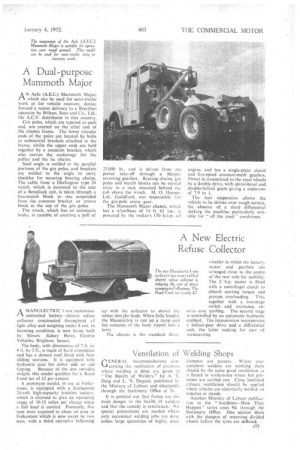A New Electric Refuse Collector
Page 53

If you've noticed an error in this article please click here to report it so we can fix it.
A MANULECTRIC I-ton pedestrianPi controlled battery electric refuse collector constructed throughout ef . light alloy and weighing under 8 cwt. in licensing condition, is now being built by Messrs Sidney Holes Electric Vehicles, Brighton, Sussex.
The body, with dimensions of 7 ft. by 4 re by 2 ft., is made of herd aluminium and has a domed roof fitted with Four sliding sections. It is equipped with hydraulic gear for either side or end tipping. Because of the low tmladen weight, this model qualifies for a Road Fund tax of /2 per annum.
A prototype model, in use at Folkestone, is equipped with a leathanocie 24-volt high-capacity traction battery, which is claimed to give an operating range of 10-12 miles per charge when ,a full load is carried. Formerly, five men were required to clean an area in Folkestone which is now swept by two men, with a third operative Following up with the collector to shovel the refuse into She .body. When fully loaded. the Manulectric is run up a ramp and the contents of the body tipped into a lorry.
The chassis is the standard three wheeler in which the battery. motor and gearbox are arranged close to the centre of the rear axle for stability, The 2' h.p. motor is fitted with a centrifugal clutch to absorb starting torque and prevent overloading. This. together with a two-stage switch and resistance, en sures easy starting. The second stage is controlled by an automatic hydraulic dashpot, The transmission incorporates a helical-gear drive and a differential unit, the latter making for ease of manteuvring.




















































































